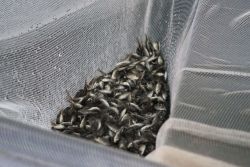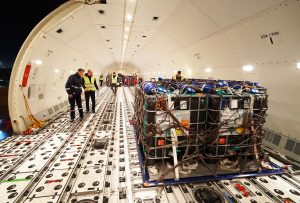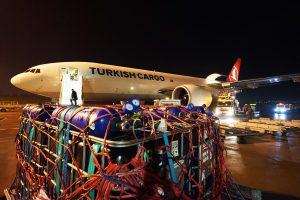Air, Feature, Freight News
Fish fly thanks to Turkish Cargo
[ March 29, 2018 // Chris ]Fish were able to fly at 30,000 feet above the clouds when Turkish Cargo carried 1.5 million live Gilt-head Breams from Izmir to Oman.
The young fish had been raised in the Aegean region by Kilic Holding and were flown on a chartered 777F freighter, accompanied by aquaculture engineers, who maintained the pH balance, oxygen and water temperature levels.
Turkish Airlines’ chief cargo officer Turhan Ozen, said: “The 100 tons of live fish were required to be transported to Oman from Bodrum in a maximum of 40 hours.” They were trucked to Izmir in three hours for loading onto the freighter which flew them to Oman in three hours, well within time window required.
Ozen added: “We accomplished this operation by means of our Boeing 777F type freighter in accordance with IATA Live Animals Regulations, reinforcing our success in transportation of live animals requiring an utmost level of care. Carrying 1,5 million live fish by means of a freighter requires accurate air-conditioning and expertise in oxygen and temperature checks.”
Furthermore, the cargo was classified dangerous goods due to the oxygen cylinders used.
Turkish Cargo is often called on to move live fish to countries such as Tunisia, Oman, Qatar and Saudi Arabia.
Kilic Holding executive vice president for production Serkan Ilgaz, added: ‘’We are the only company performing sea fish imports operations from Turkey. We hope to keep developing our cooperation with our flag-carrier airline in future.”
Turkish Cargo also carried 3,000 tonnes of cut roses to Holland in its wide body cargo aircraft.
The carrier scheduled 12 additional flights between 26 January and 12 February to satisfy Valentine’s Day demand.
It moved 234 tonnes more flowers from Nairobi in that time than its nearest rival.
With its tropical climate, Kenya is a centre of flower production and exports all over the world. Turkish Cargo operates five regular weekly passenger flights from Nairobi and three freighters a week to Maastricht, carrying an average of 340 tonnes of cut roses every week.
Flowers arrive at the cargo terminal in air-conditioned trucks and kept separate from any vegetable or fruit so that they are not affected by ethylene gas.
Tags: Turkish Airlines













